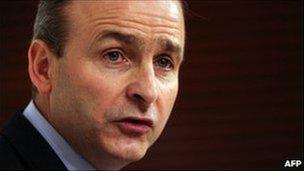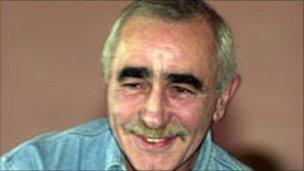Boston College says IICD documents will remain confidential for 30 years
- Published

Micheal Martin said the decision was "ill-considered"
Boston College has said that documents in its archive, from the body which oversaw paramilitary decommissioning, will remain confidential for 30 years.
Earlier, Fianna Fail leader Micheal Martin said he was concerned that the material was being held at the college.
He said the decision was potentially damaging to peace and reconciliation.
Boston College is already the focus of legal action over interview transcripts of former paramilitaries.
The International Independent Commission on Decommissioning (IICD) was the body which oversaw paramilitary decommissioning in Northern Ireland.
It presented its final report in 2011 to both the British and Irish governments.
In a statement to the BBC, Boston College said: "There is no conceivable reason why the British or Irish governments, which set the terms for the International Independent Commission on Decommissioning (IICD) papers when they were sent to the college, would break those terms."
Mr Martin said it was of "major concern" that the IICD documents were being held at the US college.
"These papers catalogue the details of the engagement of paramilitary groups with the decommissioning process and for reasons of security and safety it is imperative that these papers are not made public for a sufficient period of time," he said.
"What is of major concern is that these papers have been given to an institution outside the island of Ireland which is now involved in a major controversy about protecting the integrity of its sealed archive."
In response, the Republic's Justice Minister Alan Shatter said such comments were "disingenuous, inaccurate and misleading".
In a statement he said the IICD detailed the different arrangements made by them for storage of their documentation.
"Papers from political parties setting out their views on decommissioning and other private correspondence received from individuals was deposited by them for safe keeping in Boston College, subject to an embargo on their disclosure for 30 years," said Mr Shatter.
"Details of the quantity of arms decommissioned by the various paramilitary groups were placed with the US State Department to preserve their security and confidentiality on the basis of the commission's assessment that the time was not right for them to be made public."

The late Brendan Hughes was one of the people who gave interviews to Boston College
Minister Shatter also said that both the Republic's Department of Justice and the Northern Ireland Office have been monitoring the situation in relation to the current legal proceedings in Boston pertaining to the oral archives and "will remain in contact about the matter".
"However, there is no reason to believe that there are particular grounds for concern about the arrangements made by the commission, after consultation with the then governments."
Boston College is the subject of a legal challenge by the British authorities who have requested that the college hand over interviews with former republicans and loyalists.
Promise
What was termed the 'Belfast Project' took place over five years from 2001 and involved academics, historians and journalists conducting interviews with former republicans and loyalists about their activities during the Troubles.
In return for honest accounts, those who were interviewed were promised that their identities would be kept confidential and that the interviews would be released only after their deaths.
As part of a legal challenge by the British authorities, transcripts of interviews that former IRA member Dolours Price gave have been received by US officials.
Writer Ed Moloney and republican researcher Anthony McIntyre, who carried out the interviews are trying to stop the material being handed over to the British authorities.
The people who Mr Moloney and Mr McIntyre interviewed spoke only with the caveat that the material would not be made public until after their deaths.
Boston College has said the project was "based on a contract between Boston College and project leader Ed Moloney, which stated that they would be kept confidential until the death of the participants to the extent American law allows."
- Published9 January 2012
- Published3 January 2012
- Published30 December 2011
- Published21 June 2011
- Published13 May 2011